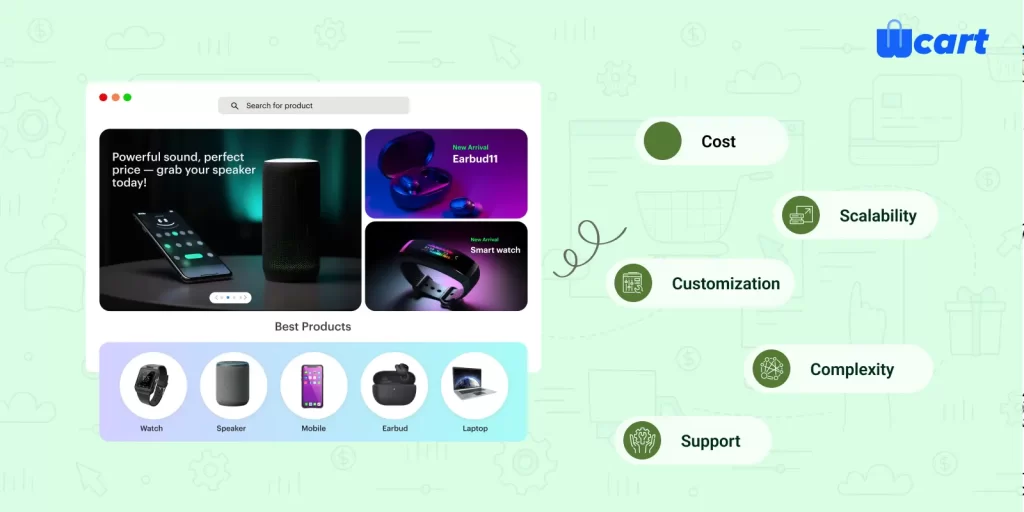Magento doesn’t suit all types of ecommerce businesses. Our team found that 73% of companies migrating from Magento cite high development costs as their primary concern.
If you’re dealing with slow site speeds, technical challenges, or rising maintenance costs that cut into your margins, you’re not alone—thousands of businesses are rethinking their ecommerce infrastructure.
To solve this, our ecommerce experts have analyzed 20 major alternatives. We have tested each platform’s performance, scalability, and ease of use based on real world business needs in various industries.
This comprehensive guide reveals the 8 best Magento alternatives with detailed comparisons of features, pricing, and migration complexity.
Why look for Magento alternatives? Magento is strong, but today’s online stores need to be faster, easier to use, and more flexible. Newer platforms like Wcart do these things better.
Read More: To Know about Top Platform for Magento Alternatives.
Why are you looking for a Magento Alternatives?

If you’re considering switching from Magento to another eCommerce platform, there could be several reasons for it. Some of the common reasons businesses look for Magento alternatives are:
- Cost: Magento can be expensive to operate, especially for small businesses. The licensing fees, hosting, and development costs can add up quickly. Especially the developer cost to maintain is expensive and quite steep.
- Complexity: One of the challenges with using Magento is that the platform can be complex and requires advanced technical knowledge to set up and customize. This can make it difficult for non-technical users to use and manage the platform effectively.
- Support: Magento has a steep learning curve, and community support can be limited. This can make it difficult to troubleshoot issues and get the help you need.
- Scalability: Magento may not be the best fit for businesses that are rapidly growing and need to scale quickly. The platform may not be able to handle high traffic and may become slow and unresponsive.
- Customization: While Magento offers a lot of customization options, some businesses may require more flexibility and control over their store’s design and functionality.
Overall by exploring Magento alternatives, businesses can find a platform that better fits their needs, is more cost-effective, and offers better support and scalability.
Key considerations when choosing a Magento alternatives

When choosing a Magento alternative, there are several key considerations to keep in mind:
- Features and functionality: You want to choose a platform that offers all the features and functionality you need to run your eCommerce store. This can include payment options, shipping integrations, SEO tools, and more.
- Ease of use: Choosing an eCommerce platform that is easy to set up and use, even if you lack technical expertise, can be a wise decision for your business. Not only can it save you time and money in the long run, but it can also help you avoid frustration and setbacks during the setup process. Therefore, when evaluating Magento alternatives, consider the platforms’ ease of use and choose one that fits your level of technical expertise.
- Customization options: You want to choose a platform that offers customization options to help you create a unique and branded store. This can include themes, templates, and the ability to add custom code.
- Pricing: You want to choose a platform that is cost-effective and fits within your budget. This can include subscription fees, transaction fees, and hosting costs.
- Support: You want to choose a platform that offers reliable and responsive support. This can include customer service, documentation, and a user community.
- Scalability: Choose a scalable platform that accommodates your business growth and effectively manages higher traffic and transactions.
Finally, by considering these key factors, you can choose a Magento alternative that best fits your business needs and goals.
Explore More: To Choose Right Ecommerce Solutions
Top 5 Magento Alternatives for Your Online Store
Our top 5 Magento alternatives you should be aware of before launching your successful online business.
1. Wcart

Wcart is a cloud-based ecommerce platform that simplifies the creation and management of online stores for businesses. As an alternative to Magento, Wcart offers more flexibility and customization options to meet the specific needs of businesses. The platform has a user-friendly interface that allows users to quickly design and launch their online store.
Wcart’s main features include a user-friendly drag-and-drop website builder for creating personalized online stores, along with customizable checkout pages, multi-currency support, and integration with popular payment gateways like PayPal, Stripe, and Square.
This versatility allows businesses to customize their online store to match their unique product offerings. Additionally, Wcart provides a trial for businesses to test the platform before committing to a pricing plan.
2. Webnexs

Webnexs offers businesses a complete range of tools and features for efficiently managing their online stores. With Webnexs, businesses can handle product and inventory management, payment processing, sales, customer data tracking, and more. The platform also offers marketing and SEO tools to help businesses increase sales and drive traffic.
Its drag-and-drop storefront builder allows businesses to effortlessly create distinctive storefronts without coding expertise. The platform also provides various templates and themes that businesses can use to get started quickly.
Webnexs offers several tools to help businesses boost sales, including email marketing, social media integration, and SEO optimization.
3. Woocommerce

WooCommerce is a free and open-source eCommerce plugin designed for WordPress websites. It has become a popular platform for small and medium-sized businesses seeking to establish an online presence.WooCommerce provides robust features for efficient online store management, encompassing inventory and product control, as well as order and payment processing. Additionally, it comes with built-in support for shipping and tax calculations.
Hence it provides abundant customization options for businesses to create a distinct and personalized online store, tailored to their branding and operational requirements, through design templates and third-party extensions. Overall, WooCommerce is a reliable and cost-effective platform that offers a lot of flexibility and control over your eCommerce store.
Read More: To Know about Woocommerce Alternatives
4. Shopify

Shopify, a widely used all-in-one e-commerce platform, enables businesses of all sizes to effortlessly create and handle online stores with customizable templates, a built-in payment gateway, shipping tools, and marketing and sales features, making it a favored option for many.
It offers a range of features and tools that can help businesses sell their products online effectively. These features include customizable templates and themes, a built-in payment gateway that accepts various payment methods, shipping tools like real-time shipping rates and label printing, and marketing and sales features such as built-in SEO tools and integrations with social media platforms like Facebook and Instagram. Additionally, Shopify provides inventory management tools, order tracking, and customer profiles to help businesses manage their online store.
Read More: To Know about Shopify Alternatives
5. Squarespace

Squarespace, a popular all-in-one website builder, and ecommerce platform allow businesses to effortlessly create and manage their online store, website, and digital content in a single location. With its range of templates, design tools, and ecommerce features, Squarespace facilitates the rapid creation of professional-looking online stores for businesses of any size. Known for its user-friendly interface and dependable customer support, Squarespace is the perfect choice for businesses lacking technical expertise.
Additionally, Squarespace provides tools for creating and managing blogs and other digital content, allowing businesses to establish a robust online presence. Overall, Squarespace is a comprehensive platform that enables businesses to create, customize, and manage their online store and website with ease.
Read More: To Know about Squarespace Alternatives
Final Thoughts
Choose the right Magento alternative that accelerates your growth. While the platforms we’ve covered offer more advantages, the wrong choice could cost you more than staying with Magento.
Get Your Free 2-Minute Platform Match
Our quick assessment tells you exactly which platform fits your business:
- Your top 2 recommended alternatives
- Estimated migration cost & timeline
- Expected performance improvements
Find your perfect platform with us!
2,847+ store owners used this to avoid costly platform mistakes. Takes less time than reading another comparison.




Leave a Reply